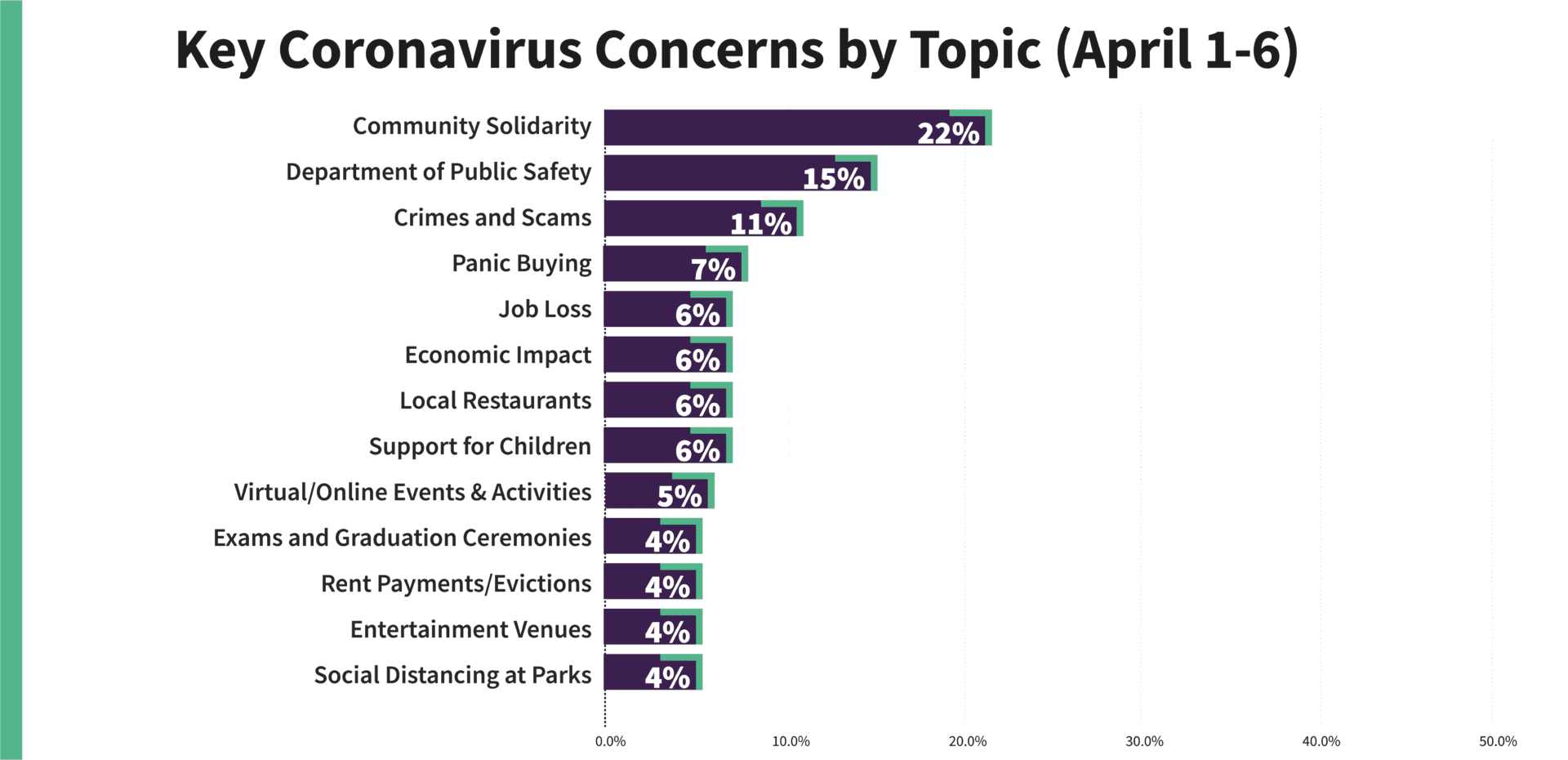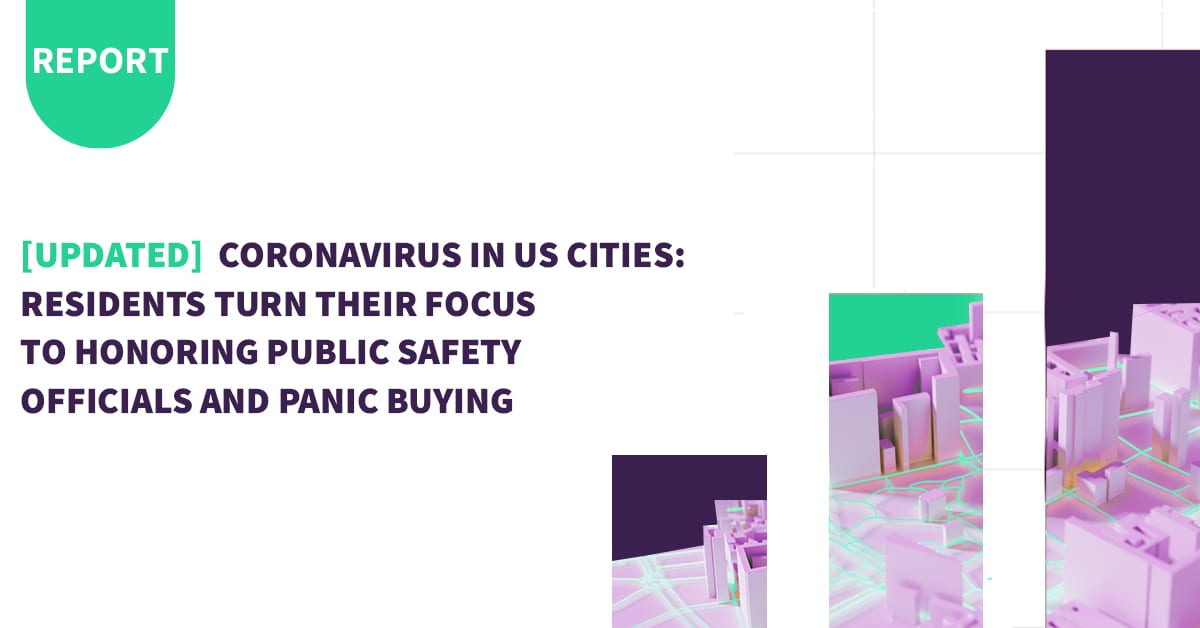Residents are honoring public safety officials and panic buying

Maurice Classen
Chief Operating Officer
COVID-19 has made it harder for local governments to physically hear from their communities, especially at a time when they need their feedback the most. City halls are closed, many local government teams are working remotely, and most community meetings and activities have been suspended or transferred to the virtual realm. Subsequently, “traditional” channels of communication between residents and their local government agencies are no longer available.
Yet while in-person communication has decreased, another channel is bustling with activity. People are increasingly using social media to raise their concerns and discuss points of interest surrounding the coronavirus outbreak. Social media presents a powerful opportunity for local governments to listen to their residents. Notably, people are talking about their cities and related concerns/opinions on social media every day, especially in a time when change is constant and the future is unclear. By monitoring the issues that their residents are discussing, local government teams, on the frontlines of this outbreak, can better adjust their communications and budget priorities and initiatives.
Aiming to help local government leaders understand the public discourse, our team at Zencity has been tracking the changes in public online discussions surrounding COVID-19 from week to week since the beginning of March. On a high level, we’ve seen residents’ key concerns evolve every week as the virus touched down in the US and then seeped into every facet of daily life. This week’s research is based on the analysis of over 4.7 million social data points from 130+ US cities and counties, from April 1st-6th and the data has a story to tell.
Our main findings this week include:
- Top three concerns remain in place – After seeing weekly shifts in the top concerns for the first three weeks of our research, this week’s data exemplifies some consistency. The top three coronavirus concerns/points of interest have remained dominant since last week’s report and include: Community Solidarity, Department of Public Safety, Crime and Scams.
- Support for public safety overshadows concern about crime – in a shift from last week, we see that residents have significantly increased their mentions of support for the public safety departments in this crisis, while reducing conversations about crime and scams.
- Public online discourse around panic buying has increased by 50% – this topic jumped to become the 4th most prominent concern while growing in volume by 50% over last week.
- Residents concerned with higher education – A new concern emerged this week, as we complete the first week of April. Residents have begun to actively discuss the topic of exams and graduations ceremonies and how they will be impacted by COVID-19.
Let’s dive into this week’s data a bit further to better understand what the public has to say:
Residents’ key concerns around COVID-19, in numbers:

As we can see, the top three concerns remain at the lead from last week. This consistency indicates that people have shifted to a new normal, understanding that the current changes are not a passing event. This data also indicates that local governments need to address these matters with long-lasting initiatives and possible policies.
Let’s explore what learnings we can draw from these concerns:
Community solidarity remains the top focus in US cities
The public’s focus on Community Solidarity has maintained its place as the leading topic of conversation amongst residents, and is growing in focus. In fact, since last week’s report, the topic has increased by an additional 2% in the public online discourse, further cementing its status. Guided by community members’ discourse, local governments are in a strategic position to contribute and provide support to residents, by highlighting current initiatives and working to build new ones. Below we touch on some key takeaways from the discourse on this topic:
- Main topics of conversation within this category remain the same as last week, with requests for further support for first responders, like medical staff, police and firefighters, followed by how-to explanations for DIY mask creation, and supply donations. We’ve seen incredible initiatives by cities across the U.S. to support their first responders, including the “Deschutes First Response Fund,” a relief fund to support first responders working the front lines of the COVID-19 pandemic in Deschutes County, OR, and a meal donation drive for first responders and hospital staff members in West Ridge, IL.
- A lot of residents are actively sewing masks for people in need and discussing it online. We saw some residents even sharing “tutorials” for how to make masks. Many cities and local governments are also actively encouraging the donation of masks by their community members. In a commendable example of community unity, a retired nurse from Geddes, NY, has been sewing hundreds of masks for members of her community, free of charge.
- Based on the data, residents are also concerned with supply shortages in hospitals and raising funds to support those in need. Discussions about general food donations have decreased over the past week.
Positive interactions between the public safety department and residents overshadow concerns about crime
For the third week in a row, operations of public safety departments remain a top interest in the public discourse, rising to 15% (compared to 13% in the previous week). Concurrently, we saw a small drop in conversations around Crimes and Scams. This week residents are mostly discussing public safety in a very positive manner – sharing thank you posts dedicated to local first responders and reacting to social distancing compliant “thank you parades” set up by local departments. We’ve seen many local communities across the U.S. come together to support their first responders. In addition to the recognition of the tireless, ongoing work of the public safety department we dug into a few additional data points below:
- Many police departments are leveraging this growing attention on social media to actively inform their residents on social distancing guidelines and explain whether or how they will be enforcing stay-at-home orders.
- Police departments are also utilizing social media to increase community relations by sharing updates on how they are working to keep the safety of residents. For example, the Essexville Public Safety Department has been putting up heart signs on their windows to show their commitment to the community.
- While the discourse around crimes and scams have slightly decreased since last week, new topics that are drawing more attention include theft of testing kits.
- Residents are also showing growing interest in the discussion of prison inmates who are considered for release, either due to positive COVID-19 testing or to avoid fast infection by releasing vulnerable, “low-risk” inmates and reducing transmission rates in crowded facilities.
Panic buying and associated hoarding become a leading concern
Most notably, we’ve noticed a significant rise in the discourse surrounding panic buying, with an increase of approximately 50% from last week’s report. From the onset of the pandemic, we’ve seen how fear can manifest itself in peoples’ daily activities, mainly by way of panic buying. Additionally, supermarkets and grocery stores have become hazardous spreading grounds for COVID-19, instilling a growing concern for standing in checkout lines in close proximity of others, and requests for more enforcement of social distancing in the stores themselves. Here is how the discourse this past week exemplifies this particular behavior and its impact:
- Many residents are concerned about the lack of social distancing enforcement in grocery stores and that the risk of infection from visiting these establishments is extremely high. Food stores throughout the country are arming themselves accordingly, installing plexiglass at each cash register in Florida for the safety of both customers and staff. They are also brainstorming new ways to control the distance between shoppers. Kroger, for example, the largest supermarket operator in the U.S., is testing out one-way aisles at some of their stores.
- There has also been continuous concern surrounding hoarding by community members, thereby leading to supply and stock shortages.
- Local mayors and government officials are urging their citizens to stop panic buying and are utilizing social media to get the message out. Eric Garcetti, Mayor of Los Angeles, CA, stood alongside the leaders of several major grocery store chains, in an act of reassurance to Los Angelinos of their handling of the situation and encouraging people to buy less.
- One of the more concerning conversation points, as more cities require residents to wear masks and cover faces, is the confusion around where masks can be purchased (especially considering that many cities are in short supply).
New Topic: Final exams and graduation ceremonies
With May graduation ceremonies around the corner, it seems that stay-at-home orders will have many educational institutions closed for more weeks to come. This has caused colleges and universities nationwide to announce that graduation ceremonies are going virtual. Naturally, the public discourse on the matter has grown throughout the past week, occupying 4% of residents’ online conversations:
- Online discussions during the past week include concerns about if and how upcoming final exams will be taken, and whether local graduation ceremonies will be held as planned. Some residents have reacted positively to the idea of virtual commencement ceremonies while others have actively called for postponements.
- The emerging discourse about exams could also be a result of recent developments regarding university and college admissions for 2021. With the April ACT session postponed and the May SAT test cancelled completely, multiple colleges and universities are deciding to move to test-optional admissions where undergraduate applicants will no longer be required to submit standardized test scores. Institutions converting to test-optional admissions due to the pandemic include the University of California schools and Boston University.
- Naturally, the online discourse includes some reports of students testing positive for COVID-19, but also surrounds the varied and wonderful ways that students are stepping up to support hospitals and local communities, such as volunteering at call centers and caring for healthcare professionals’ children.
- Residents are raising their concerns and criticism towards students who have tested positive for COVID-19, following spring-break trips. This subject has been widely discussed on national news following multiple stories of spring breakers who have returned with the virus and not heeded CDC guidelines.
Wrap-up
Our analysis of nearly 4.7M social media interactions within our 130+ local government partner network from this past week, has shown that the main topics of concern have remained consistent across the board. Another trend that remains the same as last week is the diversity of topics. From support for local businesses and children, online recreational activities and volunteering initiatives, to evictions and job loss – COVID-19 is without a doubt impacting the fabric of society. There is no “returning to normal”.
Considering the far-reaching impact of this global pandemic, it is imperative that the local government teams not only break through the noise and share actionable information with their residents, but in turn, are able to track and understand the most pressing issues facing their residents week to week.
With that in mind, local government teams should aim to create long standing services and policies that address these consistent concerns. They should also seek out opportunities to collaborate with their vocal, online community on possible initiatives. We’ve seen amazing examples of this across the United States and commend the hardworking women and men in local government for their exemplary efforts during this challenging time.
To learn more about how our partner cities and counties utilize Zencity to monitor their residents’ concerns even on a daily basis, visit our dedicated COVID-19 action plan.
%20copy-1.png?width=544&height=120&name=Logo_black%20(1)%20copy-1.png)



